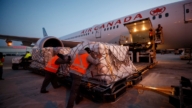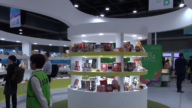【新唐人2013年08月12日讯】最近,中共国家发改委对6家国外奶粉企业,开出高达6.7亿的反垄断罚单,这是继今年一月,当局首次对南韩三星等6家外资企业进行反垄断处罚后,对外资企业的又一次开炮。那么中共的这些反垄断举动,是在真正学习西方国家为保护消费者的利益而执行的反垄断法,还是另有图谋呢?请看专家分析。
近日,中共国家发改委对6家国外奶粉企业,开出高达6.7亿元的反垄断罚单,这是中共历史上对境外企业开出的最高罚单,其中包括合生元,美赞臣,多美滋、雅培、富仕兰、恒天然乳业公司。中共还宣称,是这些企业违反了大陆《反垄断法》的规定,存在价格垄断和价格操纵,处罚额度为上一年销售额的1%-10%。
大陆企业观察员何军樵:“如果中华人民共和国政府真正要执行反垄断法的话,它应该对中国这么多的垄断的国企和央企来执行这样的法律,而不只是针对几家涉外企业,奶粉企业开一个天价的罚单,我们都知道中国的奶粉一直有问题。”
那么,当局对外企强势开炮,动机是什么呢?
大陆企业观察员何军樵指出,中国人喝水,用电,开车及烧油等等攸关民生的产品,都是世界上最贵的,而这些命脉企业恰恰都是国营垄断企业。
台大经济系教授 张清溪:“国外的企业不管怎样,特别是奶业,一定比中国的要守法,它对它们去开罚单,第一个是想做给中国人看,第二个我觉得,在国内厂商的压力下,他要对外国厂商动刀,来保护国内厂商的利益。”
一段时间以来,北京当局对外国企业进行严厉审查的事件频频发生。今年3月份,中共喉舌指控苹果公司“贪婪 ”和无比傲慢”,指控大众汽车的变速箱有问题,导致“大众”在中国被召回38万辆车。新年伊始,又对三星等6家电子生产商执行了1.44亿反垄断罚款。
从去年9月9号开始,大批受害台商每天定点在台北车站游行抗议,控诉他们遭到中共迫害,血本无归,家破人亡的血泪史。台湾陆委会表示,台商在中国主要是受到刑事迫害,危及到他们的人身财产安全。
张清溪:“招商引资,招外国人企业来,开始还会受到优惠,你做成功了,它们就想要接收你的企业,甚至是用抢夺的方式,我觉得有各种原因,社会道德败坏,主要是官方的权力没有受到节制。”
从2011年开始,由于人力成本上升、外资税收优惠不再、人民币不断升值等原因,外资企业一波接一波撤离中国。
截至今年6月5号的五个交易日内,有8亿3400万美元撤出中国股市,创下2008年1月金融危机爆发以来的最大外资流出规模。外界观察,外资的“中国梦”开始破碎。
美国南卡罗莱纳大学艾肯商学院教授 谢田:“对中共这样一个极度残害人权,不能实行法治的这样一个政权,你跟它打交道,做生意,你可能获利一时,终究会尝到苦头,现在西方公司现在真正开始尝到苦头了。
不过,据中共喉舌的报导,受到处罚的6家公司中,包括美赞臣在内的3家公司已经表示,会缴纳中共当局处以的罚款,其中恒天然公司说,将完全配合并接受决定。
谢田:“这实际上是很奇怪,这些公司包括美国的一家公司,一般来说,不会轻易的接受政府的行政罚款,除非政府拿出证据,现在没看到中共政府拿出确凿的证据,罚款的实质和中国奶粉企业的丑闻有关系,这些企业又害怕中共报复,它们当然可能是出于自保的手段。”
美国南卡罗莱纳大学艾肯商学院教授谢田认为,中共可能企图通过对这些公司的处罚,转移视线,给国内民众一种中共在为民谋福利的错觉,从而忽略了实际存在的问题。
采访编辑/刘惠 后制/葛雷
Why is the CCP Imposing Huge Fines on Foreign Companies?
Recently, the Chinese Communist Party (CCP) authorities
fined six foreign infant formula companies nearly 670 million
yuan ($109 million) in total for anti-competitive behavior.
This marks another attack against foreign companies
by the CCP government,
following its fines against Samsung and other five
foreign companies for the same reason this January.
In doing this, does the CCP simply intend to protect
the interests of consumers by enforcing anti-monopoly laws
as is usually done in western countries,
or there are other motives behind the move?
Experts will share their analysis below.
Days ago, the CCP’s National Development and
Reform Commission (NDRC) imposed a huge anti-trust fine of
670 million yuan ($109 million)
to six foreign infant formula companies.
This is the largest fine the CCP has ever issued
against foreign companies.
The companies subject to the fine are Biostime, Abbott,
Mead Johnson, Dumex, Friesland Campina and Fonterra.
The CCP officially announced that those companies
had violated its anti-monopoly law with anti-competitive behavior and price fixing;
therefore they were fined 1% to 10% of
their sales amount in the past year.
He Junqiao, Chinese business observer: “If China’s (the CCP’s)
government truly wants to enforce the anti-monopoly law,
it should do the same to all those state-owned companies,
instead of solely imposing a huge fine on several foreign infant formula companies.
As we all know, there exist serious quality problems with
China’s companies producing infant milk powder.”
If this argument is correct, then what really motivates
the CCP to aggressively fine those foreign companies?
He Junqiao says that Chinese people have to pay nearly the
highest prices in the world for the many everyday essentials,
including drinking water, electricity, oil, and so on.
All these life-essential industries are precisely
under the monopoly of state-owned enterprises.
Zhang Qingxi, economics professor at Taiwan University:
“In any case, foreign companies, especially milk producers,
definitely abide by the law better than their Chinese peers.
Firstly, the CCP authorities fined those companies
as a show to the Chinese to see.
Secondly, I think it is intended to protect the interests of
domestic producers by punishing foreign ones,
under the pressure from inside China.”
The CCP government has been attacking foreign companies
in various ways for some time.
This March, a party mouthpiece media accused Apple Inc.
for being “greedy and extremely arrogant”.
In the same month, its quality inspection department also
“figured out” a gearbox problem of Volkswagen,
forcing the company to recall over 380,000 vehicles in China.
Back in early January, Samsung and other five foreign
electronic companies were fined of 144 million Yuan for anti-competitive behavior.
Since Sep 9th, 2012, a large group of Taiwanese business
owners started a daily protest at a regular time in front of Taipei Railway station.
They told stories of how they were persecuted by the CCP
and ended up losing all of their possessions in mainland China.
According to Taiwan’s mainland affairs council, the major
problem is the CCP’s criminal persecution against Taiwanese
business owners, threatening the safety
of both their life and property.
Zhang Qingxi: “The CCP’s approach of attracting investment
is to give some preferential treatment to you initially.
However, if you become a big success, then they will plot to
control your company, sometimes even by directly taking it.
Personally I think there are many reasons for this,
such as demoralization of the whole society.
A major problem is that there is no restriction
on the power of the authorities.”
Since 2011, foreign companies started to retreat from China
in waves due to increasing labor costs, an end to tax benefits,
and the appreciation of yuan, among other reasons.
In only five trading days ahead of Jun 5th, 2013,
about 834 billion dollars left China’s stock market.
This is the largest outflow of foreign investment for China
since the financial crisis in January, 2008.
Some outside observers comment that this indicates
an end to the “China Dream” for foreign companies.
Xie Tian, professor at Aiken Business School, University
of South Carolina: “The CCP has always been blatantly
violating human rights and never rules the country by law.
Working with such a regime, you may make profits for
a period of time, but will suffer a lot more in the end.
Now western companies start to taste the true
bitterness in China.”
The CCP’s mouthpiece media claimed that Mead Johnson
and two other companies out of the six milk powder
producers had announced that they would pay the fines.
New Zealand’s Fonterra was reported to say that it
accepts and will fully coordinate with the decision.
Xie Tian: “This is indeed a strange thing.
Among those companies there is also an American one.
In general, they shouldn’t easily accept any administrative
fine without their violations being proved.
However, we haven’t seen any firm evidence shown
by the CCP government.
As the fine can be related to scandals of the
whole Chinese milk powder industry,
those companies may worry about further retaliation
from the CCP and therefore do something to protect themselves.”
Xie Tian says that the CCP may also aim at shifting
the public attention by imposing the huge fines on these companies.
The CCP might attempt to create the illusion that
the party is acting in the welfare people of the people,
so as to hide the real problems under its governance.

























